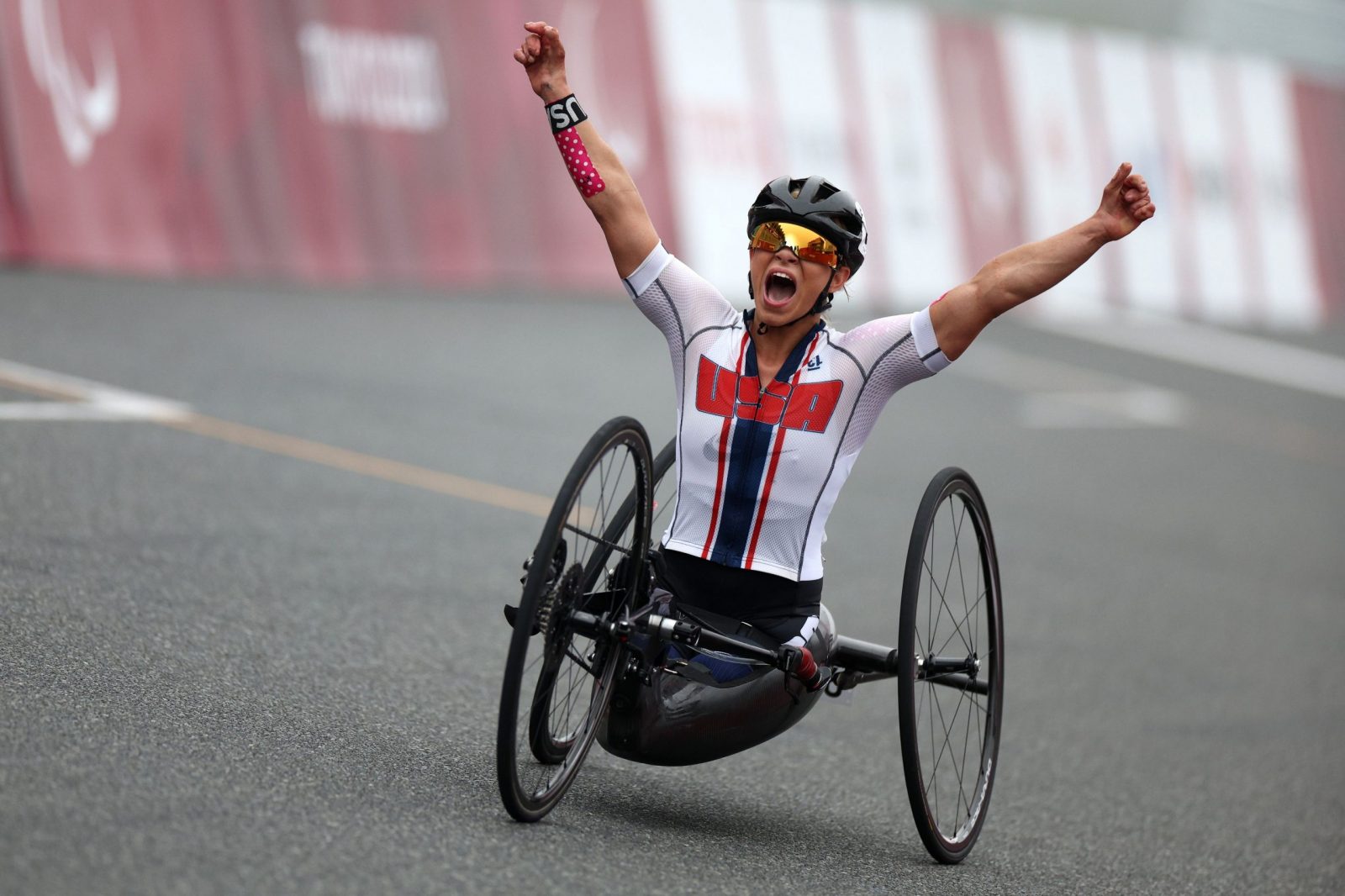
Just like Team Japan's athletes during the recent Summer Olympics, the host nation's Paralympic delegation collected at least one medal every day during the Tokyo Paralympics.
That outstanding achievement occurred over 28 days spanning July, August and September.
Combining the Olympics and the Paralympics, Japanese athletes delivered 109 total medals, including 40 gold, in the two global sporting festivals. Fifty-eight Olympic medals (from Japan's 556-athlete contingent) and 51 Paralympic medals (from the host nation's 255-member delegation) produced new heroes and fan favorites while also expanding the name recognition of dozens more in front of the bright lights and international media spotlight.
At the same time, the delayed Paralympics strengthened (or developed) our collective appreciation for sports we rarely see, even in this era of countless media outlets, social media platforms and video highlights of every competition under the sun.
Prime examples: goalball and boccia and football 5-a-side and sitting volleyball.
Above all, human drama propelled all of the sporting events.
And even though the public viewed the action in the 22 Paralympic sports from afar due to the COVID-19 pandemic restrictions (ticket holders couldn't enter venues), admiration for the athletes' dedication and pursuit of excellence was evident from start to finish.
This was apparent in monitoring the daily output of succinct and voluminous work from folks churning out stories for media outlets in all corners of the globe.
Naturally, there were some stories throughout the Paralympic Games that ascended to the top of the must-see/must-read list.
For example, I know I'm not the only one in awe of Oksana Masters' chameleon-like career and success as an athlete. Winning 10 Paralympic medals in four different sports is, well, unheard of.
But that's exactly what Masters has done.
In the Tokyo Games, she captured the gold in the women's cycling H4-5 time trial and H5 road race events at Fuji International Speedway in Shizuoka Prefecture. Both events involve hand-operated bicycles.
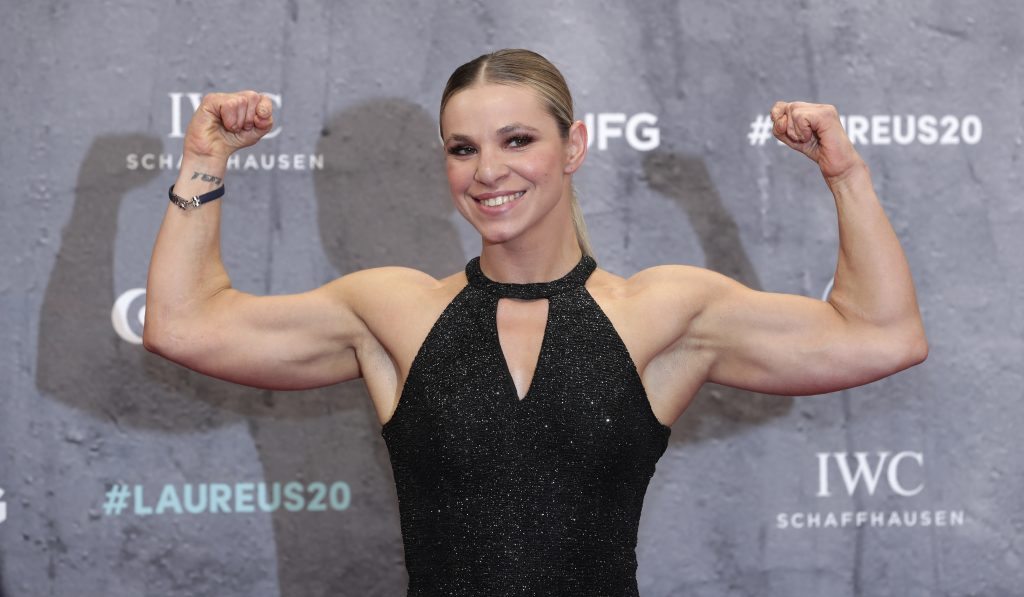
Oksana Masters arrives for the 2020 Laureus World Sports Awards in Berlin, Germany on February 17, 2020. (Michael Sohn/AP)
Masters, who was born in Ukraine, had her left leg amputated above the knee at age 9, followed by her right leg at age 14, complications from birth defects linked to radiation from the Chernobyl nuclear disaster. Deserted by her birth parents, Masters lived in a Ukrainian orphanage until she was 7 before being adopted by an American and moving to the United States.
"Success, for me, has no definitive start or end; it is an everlasting pursuit of that which scares me the most," she says in one of the inspiring quotations showcased on her personal website. "That's the place I truly live."
Masters, 32, lives for competition, as evidenced by her stick-to-itiveness across the sports landscape.
She and Rob Jones teamed up for a bronze-medal finish in the mixed double sculls rowing competition at the 2012 London Games. After a back injury, she stopped rowing and pursued opportunities in para cross-country skiing and para biathlon, and won a combined seven medals in events ranging from 1.5 km to 12.5 km in distance at the 2014 Sochi Paralympics and 2018 Pyeongchang Games.
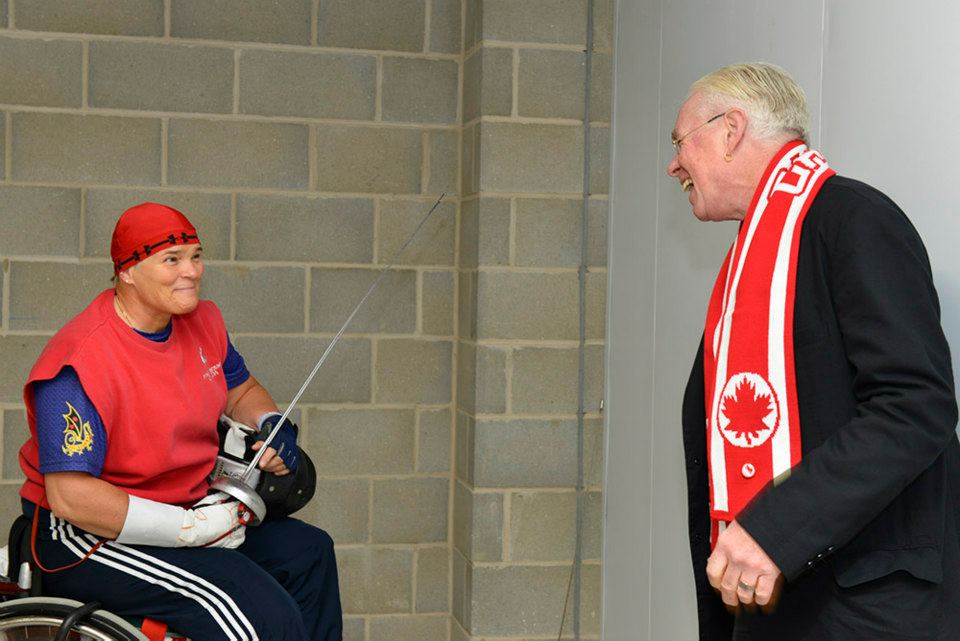
Canadian Paralympic wheelchair fencer Ruth Sylvie Morel in 2012. (Canadian Paralympic Committee)
Age is Nothing But a Number
Celebrating the love of competition for athletes from their early teens to their 60s was one of the hallmarks of the Paralympics.
Case in point: 65-year-old wheelchair fencer Ruth Sylvie Morel. The Canadian participated in the women's individual foil and sabre individual events just a few days before her birthday (September 2).
Even though she didn't take home a fencing medal, Morel's love of sports shined through while speaking to reporters about her post-Tokyo plans.
"I always wanted to try [the] javelin throw, [the] shot put, but can never get any information or help about it in my city, Montreal, and I have been trying for years to do so. Just bad luck for me I guess," said Morel, whose right leg was amputated below her knee after being involved in a traffic accident in 1993.
Morel, who also took part in the 2000 Sydney Games and the London Games 12 year later, is hoping to extend her Paralympic career again.
Will she compete in fencing, athletics or another sport in Paris in three years?
"Physically I am still very active, but time will tell. I can't pronounce myself with certainty right this moment about Paris 2024," Morel commented, according to the Canadian Broadcasting Corporation.
Indeed, the inclusivity of the Paralympics is one of its most appealing traits.
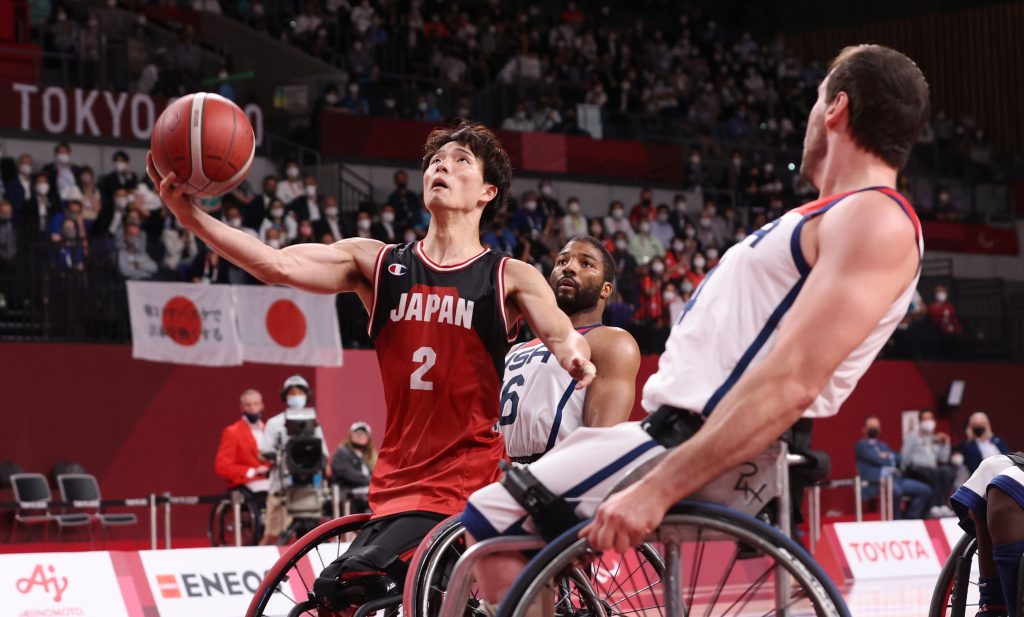
Renshi Chokai attacks the basket against the United States in the men's wheelchair basketball gold-medal game on September 5 at Ariake Arena. (Bernadett Szabo/REUTERS)
Rising Star in Wheelchair Basketball
More than 40 years younger than Morel, but equally passionate about competition, men's wheelchair basketball player Renshi Chokai, 22, provided a revealing look at his unbridled determination to make an impact in every moment of the host nation's eight matches at the Tokyo Games.
Without a doubt, Chokai played an indispensable role in Japan's success and best-ever finish (silver) in men's competition at the Paralympics. He averaged 10.5 points, 10.8 rebounds (third-best average in the tournament), 7.0 assists (No. 6) and 2.0 steals (No. 3) per game. His statistical contributions and relentless energy were distinct elements of every Team Japan contest.
The Tokyo Paralympics represent a catalyst for the nation's wheelchair basketball team, giving it a measuring stick to aim for even bigger success moving forward, according to Chokai.
“The number of people who support us has increased to an unprecedented number," Chokai told reporters after the gold-medal match on September 5, when the United States defeated Japan 64-60 at Ariake Arena in a game that can be best described as an instant classic. "We will continue to show [people] how we are fighting.”
Chokai's commitment to his craft bodes well for the Japan national team for years to come.
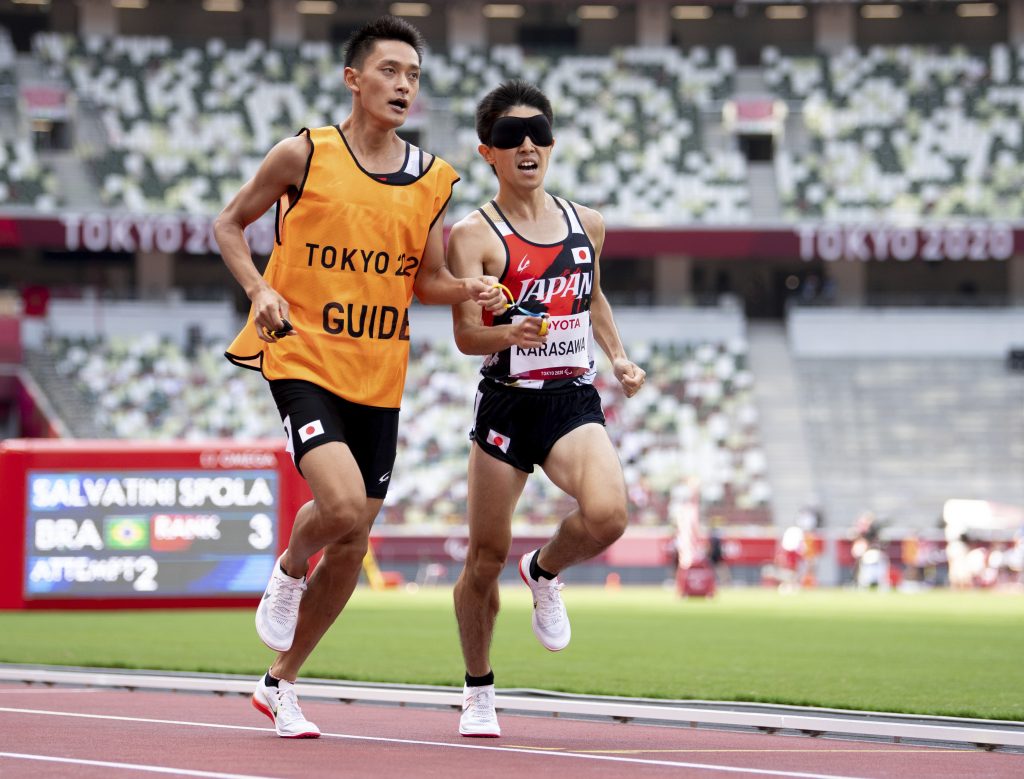
Kenya Karasawa and his guide run in the men's T11 5,000-meter final at the New National Stadium on August 27. (Joel Marklund for OIS/via AP)
The Unifying Power of Sports
The Paralympics also reminded all of us that we are interconnected.
Success stories, in sports or in other aspects of life, are never about one person alone. Support, advice and motivation from others in a variety of ways always contribute to success.
Blind runner Kenya Karasawa, who celebrated his silver medal-winning success in the men's T11 5,000-meter run at the New National Stadium on August 27 with his guides, Hiroaki Mogi and Koji Kobayashi, perfectly illustrated this point.
“My runner guide told me ‘you can do this!’, [and] thanks to his encouragement I tried the best I could," Karasawa told NHK. “I am really happy that I managed to get a medal, together with my colleagues and friends.”
Off the track, Karasawa brings comfort and healing to others as a certified massage practitioner and acupuncturist.
In the sporting venues of the Tokyo Games, Karasawa and more than 4,400 other Paralympians were focused on winning, setting records and improving upon their past performances. Every day we were also reminded that Paralympians overcome obstacles and face unique challenges throughout their lives ー and societies are always a work in progress to support their needs.
But it's important to strike an appropriate balance between both storylines.
In the final analysis, the latest Paralympic Games were a successful endeavor, not because of the number of events or the many new facilities, but because of the athletes' hunger for success and because competition provides purpose and camaraderie in their lives.
That was on display every day during the Tokyo Paralympics.
Author: Ed Odeven
Follow Ed on JAPAN Forward's [Japan Sports Notebook] here on Sundays, in [Odds and Evens] here during the week, and Twitter @ed_odeven.

Nagoya Basho Tournament Records
| Day | Opponent | Result |
|---|


















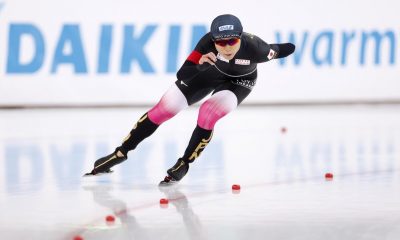

You must be logged in to post a comment Login